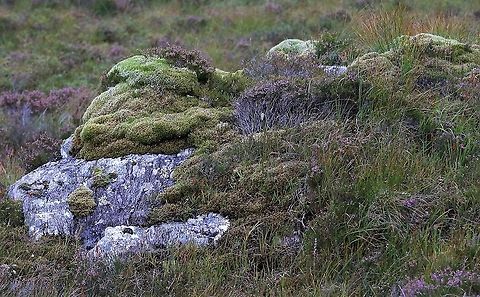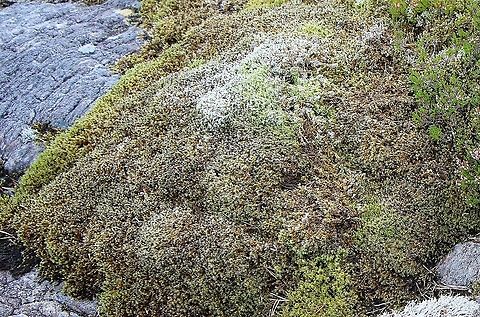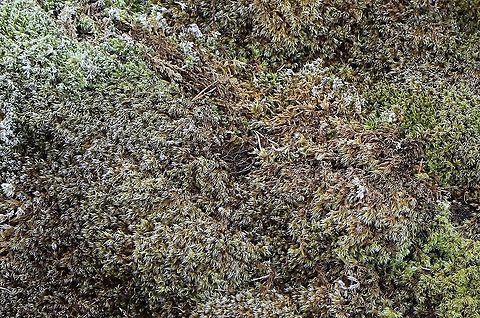
Appearance
''Racomitrium lanuginosum'' grows as "large cushiony mats". Its stems are up to 12 centimetres long and irregularly branched. The leaves are 3–5 millimetres long, 0.6–0.9 mm wide, lanceolate, pointed and with a strong midrib. They end in a long, thin hair-point, with teeth along both sides pointing 40°–90° from the axis of the leaf.The hyaline margins of the hair-point are decurrent along the sides of the leaf. Especially when dry, these hair-points give the plant a downy appearance, which is referenced in several of the common names for the species.
Sporophytes are rarely produced, although they are reported to be abundant in coastal areas. The capsules are 1.0–1.7 mm long, smooth and brown, and contain spores, which are 8–12 μm long. The form of the hair-points on the leaves of ''R. lanuginosum'' is unique among mosses.

Naming
''Racomitrium lanuginosum'' is "one of the few bryophytes familiar to many non-bryologists". Other species that may be confused with it include ''R. canescens'' and its close relatives, ''R. heterostichum'' and ''Hedwigia stellata''.
Distribution
''Racomitrium lanuginosum'' has a circumpolar distribution in the Northern Hemisphere, and is found disjunctly in the mountains of the tropics and the Southern Hemisphere.Within North America, ''R. lanuginosum'' is found widely across northern Canada, and extends further south both in the east , and in the west . It is also found in Costa Rica and in mountainous regions of South America and South Africa.
In the Atlantic Ocean, isolated population occur on Azores, the Canary Islands, Madeira, Tristan da Cunha and South Georgia; it also occurs on Réunion in the Indian Ocean, in New Zealand, Hawaii and the sub-Antarctic islands Deception Island, Kerguelen, Îles Crozet, Heard Island and the Prince Edward Islands.
As well as occurring widely across Arctic Asia, ''R. lanuginosum'' is also found in some temperate and tropical mountains on Borneo, Java, Sumatra and New Guinea. In Australia, ''R. lanuginosum'' is restricted to Tasmania and the highest ground of the Great Dividing Range on the border of New South Wales and Victoria.
Habitat
''Racomitrium lanuginosum'' grows from sea level to the alpine zone, particularly among boulder scree and on exposed rock surfaces. It will also grow in tundra or bogs. It is more frequently found on acidic rocks than calcareous ones.References:
Some text fragments are auto parsed from Wikipedia.